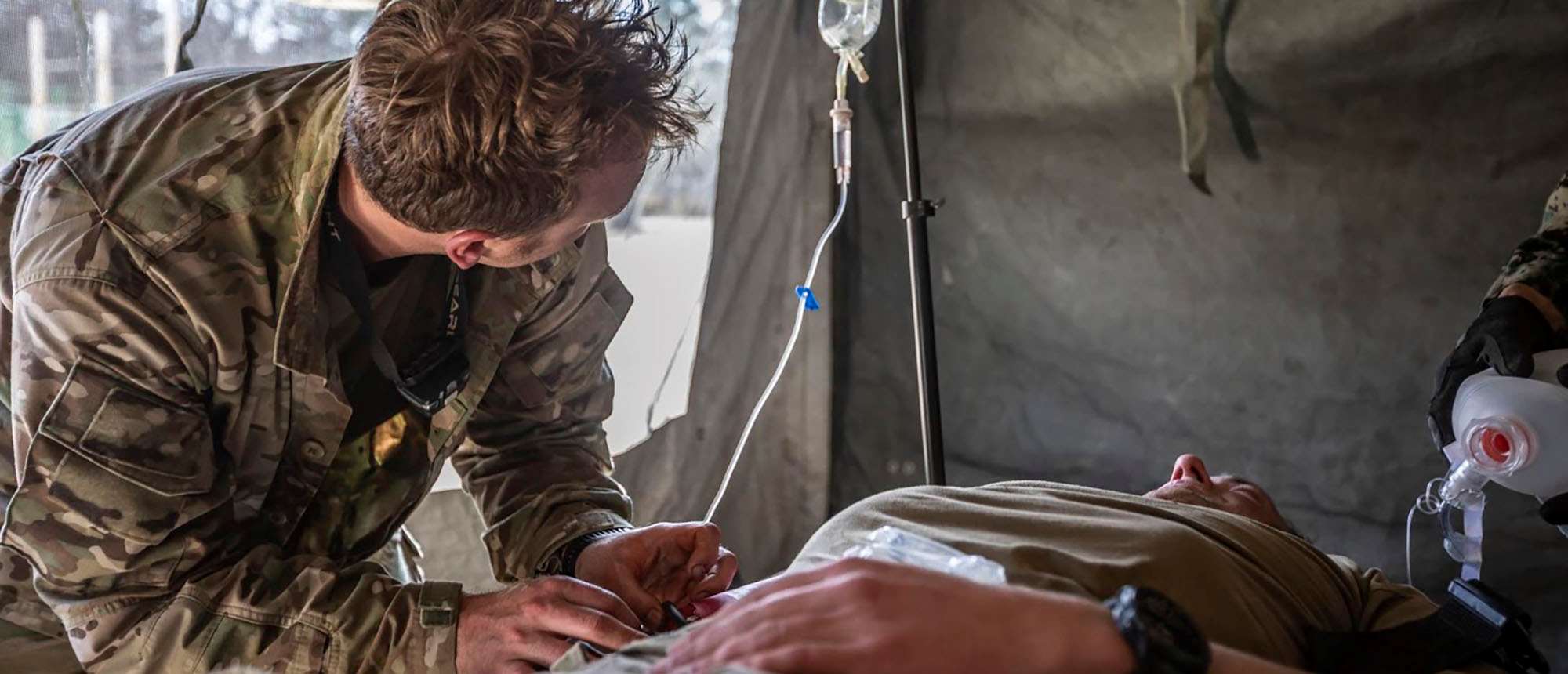From Green Beret to M1

Pete Geurts, a first-year medical student at the Medical College of Wisconsin (MCW), grew up in a close, service-oriented family, surrounded by strong role models.
His mother, a middle school counselor and citizenship instructor, and his stepfather, a teacher, both instilled in him a deep sense of compassion and duty. His two older sisters inspired him in different ways – one pursued a career in science, while the other served as a medic and later a physician in the U.S. Army.
“I wanted to make a difference,” Geurts says.
After high school, Geurts first aimed his ambitions at the football field. As a running back at the University of California, Berkeley, he dreamed of going professional. When that path didn’t materialize, he shifted his focus toward academics, majoring in history while studying Swahili and German. He spent a year abroad in Germany and later conducted historical research in Tanzania through a Foreign Language and Area Studies (FLAS) scholarship.
After graduation, he worked as a project manager in Silicon Valley. But something was missing.
“I realized I wanted to be part of something bigger,” he recalls.
His sister told him about the U.S. Army Special Forces – elite units known for blending combat skill with cultural understanding to train and support foreign forces. The mission resonated deeply. With the encouragement of his family, Geurts enlisted as a Special Forces candidate in 2016 at age 27, setting his sights on becoming a Special Forces Medical Sergeant.
“Coming from a background in sports and valuing teamwork, and after spending time abroad, the role of a medic really resonated with me,” he says. “It felt like a way to jumpstart a medical career while serving my country.”
A Globe-Trotting Medic
 Following basic training, Geurts completed the Special Forces Qualification Course, including an intensive 18-month medical training program. He studied trauma care, clinical medicine, infectious disease, pharmacology, and even dental and veterinary medicine – learning to provide lifesaving care in austere, resource-limited environments.
Following basic training, Geurts completed the Special Forces Qualification Course, including an intensive 18-month medical training program. He studied trauma care, clinical medicine, infectious disease, pharmacology, and even dental and veterinary medicine – learning to provide lifesaving care in austere, resource-limited environments.
After earning his Green Beret, he served with the 1st and 19th Special Forces Groups (Airborne), deploying with a 12-person team to countries overseas.
“It was such a great experience to work with other cultures in a global health setting,” he says. “You really learn the importance of teamwork, leadership, and cultural humility.”
Geurts saw firsthand how trust and compassion could transcend language barriers. He built lasting relationships around the world, strengthening partnerships while providing medical care in the field. He also completed rotations in military hospitals, where a battalion surgeon mentored him in the science and human side of medicine.
“I was fortunate to see the impact I could have as a medic,” Geurts says. “It showed me how meaningful medicine could be.”
During one training mission, a sergeant asked him what he wanted to do after the military. The question stuck with him. Geurts began taking night courses in biology and chemistry to test his interest in medicine – and quickly found he loved it. In 2024, after nearly a decade of service, he left the military to pursue medical school full time.
Transitioning to Medical School
 When applying to medical schools, Geurts was drawn to the Medical College of Wisconsin for its strong ties to the military and opportunities in global health. MCW’s partnerships with the Clement J. Zablocki Veterans Affairs Medical Center and its welcoming, family-oriented environment in Wauwatosa sealed the deal. Today, Geurts lives there with his fiancée and five-year-old son.
When applying to medical schools, Geurts was drawn to the Medical College of Wisconsin for its strong ties to the military and opportunities in global health. MCW’s partnerships with the Clement J. Zablocki Veterans Affairs Medical Center and its welcoming, family-oriented environment in Wauwatosa sealed the deal. Today, Geurts lives there with his fiancée and five-year-old son.
“My experiences as a medic laid the groundwork for the path I’m on today,” he says. “MCW became my top choice because of its commitment to military medicine and its dedication to global health.”
At MCW, Geurts will work with Antje Kroner-Milsch, MD, PhD, at the VA Spinal Cord Injury and Disorder Center, and with Gregory Burek, MD, through the BRAVE Program, which provides behavioral health services to veterans. He also hopes to collaborate with MCW’s Comprehensive Injury Center to help prevent veteran suicide.
“There’s so much about being a soldier that translates well into medicine,” Geurts says. “But veterans can have a hard time transitioning into civilian life. What helped me was having a plan and a strong support system, so I want to help others have the same.”
He’s also eager to engage with mentorship efforts, such as SOFtoSOM, which connects former Special Operations Forces members with pathways to medicine.
His global ambitions haven’t faded, either – he hopes to return to Tanzania one day to conduct medical research, putting his Swahili skills back to use.
“Military medicine and global health are my passions,” he says. “My goal is to make an impact in those areas in some way. I’m truly thankful for the opportunities I’ve had, and I want to make the most of my education at MCW.”
MCW Medical School Admissions FAQ
MCW offers many program options to help you become the next generation of physician leaders. Here’s what you need to know if you are interested in applying to the MCW Medical School.



